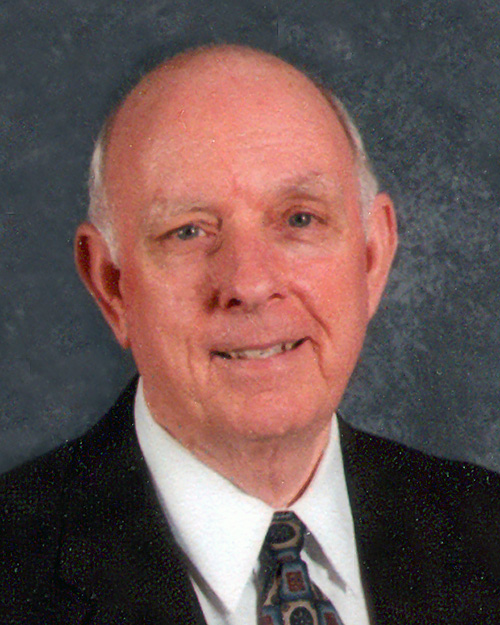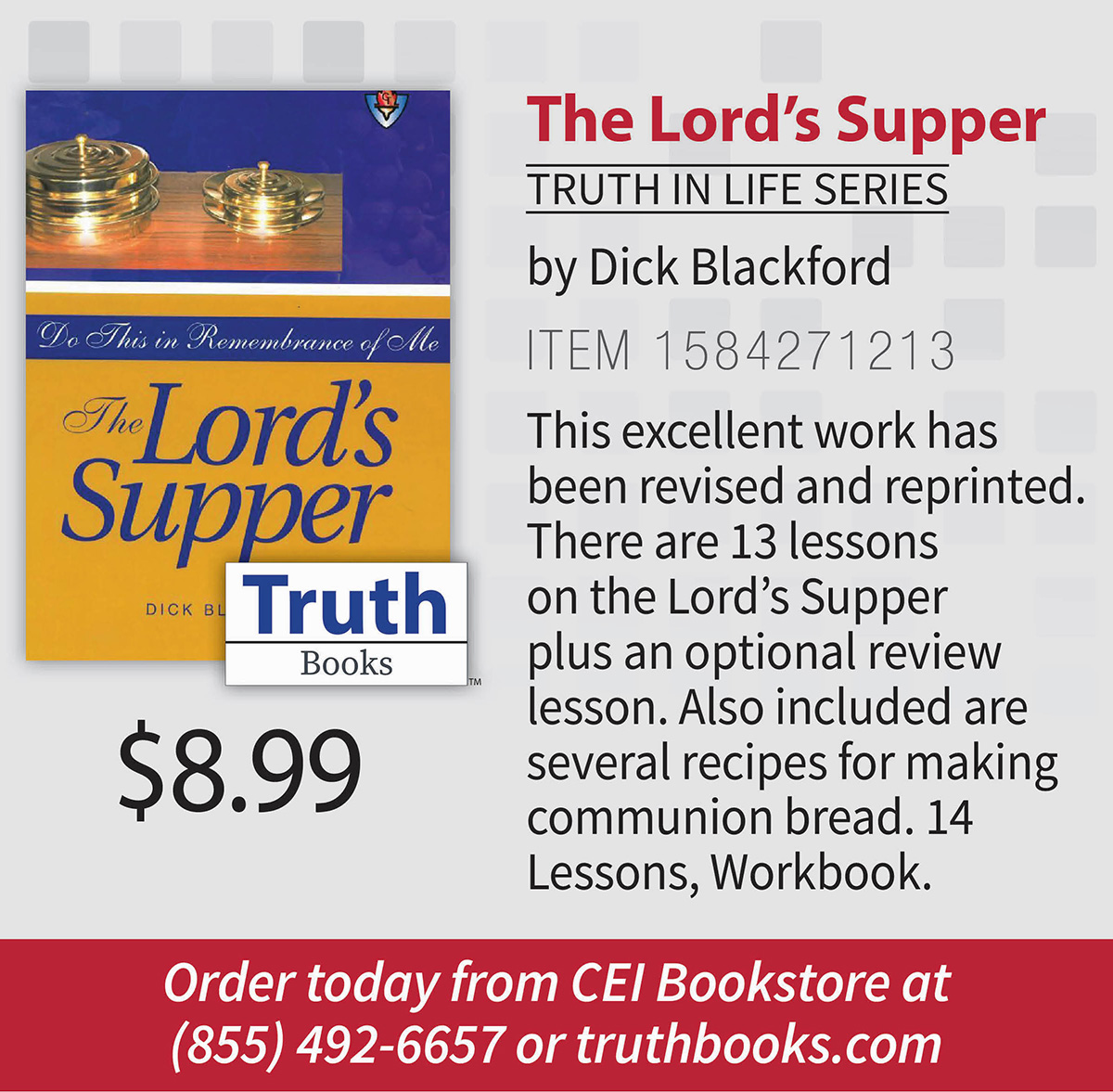


by Bobby L. Graham
Where is the command, example, or inference for offering the Lord's Supper a second time at the night service?
Brethren sometimes ask about the correctness of eating the Lord's Supper at night or in a second worship assembly of saints. It is commendable that they want to know and do what is scriptural. Sometimes they ask about a "second serving of the supper." This expression demonstrates a false concept of insisting that the church serve the supper as if the church sanctions it or makes it official or right. The New Testament speaks of eating the supper (emphasis on the partaker), but not of serving it (emphasis on the congregation). One would just as well ask about second preaching, or second singing, as the second serving of the Lord's Supper, because the New Testament doesn't specifically speak about any of them, though it generically authorizes all of them.
The mistake made by some is to insist on specific authority for what the New Testament already generically authorizes. The same passages sometimes used to restrict the supper to one assembly (i.e., Acts 20:7) also would restrict saints' meeting to one time, if viewed as specific authority. Where is the specific authority for them to meet twice, to sing twice, or to have preaching twice? Why then do our objecting brethren have more than one gathering to sing and pray and teach on the first day of the week, but not to eat the Lord's Supper? Let us study the matter to determine what is right.
What does the New Testament teach about eating the Lord's Supper (Acts 20:7; 1 Cor. 11:17-34)? (1) Authorized people: saints; (2) Authorized action: eating unleavened bread and drinking fruit of the vine; (3) Authorized place (situation): where saints assemble to eat it; (4) Authorized day: the first day of the week; (5) Authorized manner: in remembrance of Christ, discerning His body and blood. These are the scriptural features of the Lord's Supper as taught in the New Testament. When we observe these essentials, we act scripturally. To require more than these is to legislate where only God can speak (1 Cor. 4:6; 1 Pet. 4:11).
Does this allow eating it at night (or in a second gathering of saints)? When a Christian eats what the Lord specified in the manner that He commanded in a gathering of saints on the first day of the week, he has done all that the Lord binds on him to do in this matter. Who has the right to bind more? While some may have scruples that do not permit them thus to eat the supper, they have no right to forbid others the right to observe what the Lord enjoined. One's conscience should not be held over others. For what it may be worth, both Lenski and Barclay say that it was common for first-century churches to meet twice on Sunday (early in the morning for the slaves who had to work for their masters and later in the day for others). It was an effort to accommodate the slaves. Would a second service of a congregation that has outgrown its building be scriptural? Based on their teaching on this matter, some would not allow such.
(1) Some say there is no authority for the practice, but we have previously demonstrated that there is such authority.
(2) A few object because it takes place at night, asserting the disciples in Troas observed it on Saturday night in Acts 20:7, according to Jewish time. Yet, close study of the context of Acts 20 shows that the Christians were not observing Jewish time (counting a day from sundown to the next sundown), but Roman time, because Paul left "on the morrow," meaning the next day. His departure would have been the same first day of the week in Jewish time, according to the objectors. Under Roman time, disciples communed at some point after Saturday midnight, and Paul later preached till the following midnight (the beginning of the second day of the week). Paul's eating his own meal (not the Lord's Supper) in verse 11, and his departure came "on the morrow" (at daybreak).
(3) Several object to what they call a "segmental observance" of the supper, insisting that the disciples in Acts 20:7 were all present and that 1 Corinthians 11:33 requires the whole church to partake. This position is based on an unprovable assumption—that all disciples were present and eating or that all who were present ate. There are very few Sunday mornings in some large congregations when all who attend eat. If they fail to eat, then we have a segmental observance on Sunday morning. What makes a segmental observance at one time any more acceptable than at another time? "Tarry for one another" (used to condemn a "second serving") appears in a context of selfishness and division, where some were rushing ahead of others to consume their supper, making communion in the body and blood of Jesus impossible. Paul was seeking to restore the fellowship in eating and drinking by regulating their selfishness and stopping the division among them. To use the command to require simultaneous eating/drinking is to twist and abuse the apostolic mandate.
(4) Some say that it is wrong for one person to commune alone. This is based on the idea that the only communion is with the saints at the time of eating, but the Bible teaches otherwise. The Christian communes with Christ (Matt. 26:29; 1 Cor, 10:16-21) and with other saints in other places (1 Cor. 10:16-17). Paul in Ephesus was separated from the Corinthians by 275 miles (1 Cor. 16:8, 19). Neither distance nor time makes such communion among saints impossible. Five minutes (same service) or five hours (later service) do not hinder this communion. A review of the essentials earlier covered convinces us that one person can eat scripturally.
(5) Some object on the ground of the abuses that this practice has produced. It is true that some have abused the privilege of eating the Lord's Supper at a later time, but some have also abused the local church by making it into something God didn't intend it to be, the office of elders by making them into something unscriptural, and the privilege of prayer by misusing it, but the abuse never proves the scriptural practice wrong. God said to let each one eat and drink, in spite of the possibility of abusing the privilege. Some brethren will not let others do what God lets them do. God in his wisdom did not allow possible abuse of the Passover in Numbers 9:10-13 to keep him from allowing it on a later occasion. Furthermore, he never called it a "second Passover."
(6) A few have objected to being subjected to the observance of the supper by others. This is mere opinion, possibly based on selfishness. In chapter 13, Paul taught the Corinthians to love one another by being patient, kind, and long-suffering. Possibly we need more lessons along this line.
There is a marked difference between one sincerely holding to a position like this one and thus not personally eating at a later gathering (Romans 14 would defend his right to do so) and his forbidding others the right to do what the Lord told them to do (Romans 14 would condemn his doing so). One's conscience cannot become the standard for others. The brother whose conscience forbids his eating under this circumstance should not participate, but he should allow others to do as their conscience dictates. No church should ever have problems or divide over such matters. Such is inevitable when one goes to the hurtful extreme of making his conscience a binding rule for others in such matters. Is it not strange that an avenue of worship designed to unite brethren and declare their oneness in Christ (1 Cor. 10:17) has become the center of disunity and divisiveness? When people make their conscience the rule for others, such tension always follows.
Author Bio: Bobby actively participates in fill-in preaching, Belize trips, teaching an hour each day at Athens Bible School, and in gospel meeting work. He and his wife, Karen, have three children: Richard, Mary Katherine Winland (Darren), and Laura Paschall (Jeremy). He can be reached at bobbylgraham@pclnet.net.
